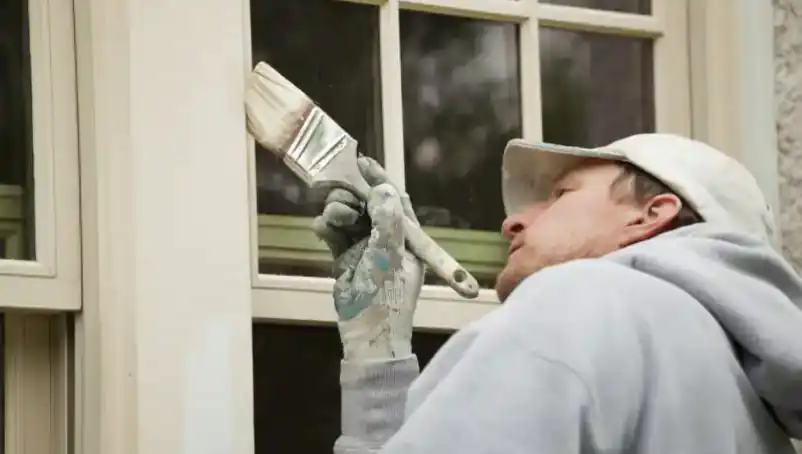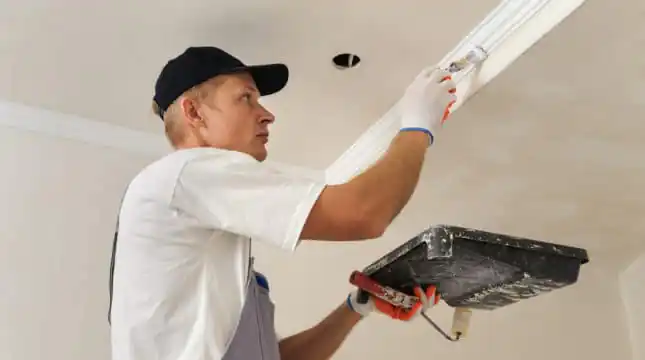Nevada
State license: Yes Business registration: Yes
Painters in Nevada must be licensed and hold a Nevada State Contractors Board license in the C-4 (Painting and Decorating) classification. They must also register their business with Nevada’s Secretary of State.
License applicants must be qualified to take the exam and will need to pass a Contractor Management Survey (business/law) exam and, in many cases, a trade exam. To qualify for a license, applicants must show at least four years of experience within the 10 previous years, submit financial statements, and have a surety bond and workers’ comp insurance if applicable. Bond requirements vary by license type and monetary limit and are set by the Board
Required business insurance in Nevada:
- Nevada requires workers’ compensation if you have any employees.
- If you drive for work-related tasks, you may need commercial auto coverage. Nevada’s minimum motor vehicle requirements are $25,000 per person / $50,000 per accident / $20,000 property damage.
New Hampshire
State license: No Business registration: Yes
Construction contractors, including painting contractors, do not need to be licensed in the state of New Hampshire. There may be local licensing requirements. Businesses must register with the state.
Individuals generally cannot perform lead abatement or lead inspection work in New Hampshire without a valid license. All applicants must attend training through an approved provider licensed by the Division of Public Health Services.
Required business insurance in New Hampshire:
- New Hampshire requires workers’ compensation if you have one or more employees.
- If you drive for work-related tasks, you may need commercial auto coverage. New Hampshire’s minimum motor vehicle requirements are $25,000 per person / $50,000 per accident / $25,000 property damage.
New Jersey
State license: No Business registration: Yes
In New Jersey, you only need to register (New Jersey treats this as a registration, not a traditional contractor “license”) as a contractor in the state. Painters fall under the umbrella of home improvement contractors and must register with the Division of Consumer Affairs.
All registered painters must have a registration badge and display their registration number in their place of business on all business documents and all advertisements.
Contractors performing lead hazard evaluation or lead abatement work in New Jersey may need state certification/permits. Painting renovation work involving lead-based paint may also need to follow the EPA’s Renovation, Repair and Painting (RRP) Rule.
Required business insurance in New Jersey:
- Home improvement contractors must have general liability insurance of not less than $500,000 per occurrence.
- New Jersey requires workers’ compensation if you have any employees.
- If you drive for work-related tasks, you may need commercial auto coverage. New Jersey’s minimum motor vehicle requirements are $15,000 per person / $30,000 per accident / $5,000 property damage.
New Mexico
State license: No Business registration: Yes
New Mexico generally requires contractors — including many specialty trades — to be licensed through the Construction Industries Division (CID). While the specific GS-19 painting license was repealed in 2016, the state might require a general residential or commercial specialty license.
Cities and counties may have license additional business registration or permitting requirements, so painters should check with local governments before taking on jobs.
Required business insurance in New Mexico:
- New Mexico may require workers’ compensation if you have three or more employees.
- If you drive for work-related tasks, you may need commercial auto coverage. New Mexico’s minimum motor vehicle requirements are $25,000 per person / $50,000 per accident / $10,000 property damage.
New York
State license: No Business registration: Yes
New York State does not require a painter’s license at the state level; however, there are requirements at the local government level. Businesses must also register their business.
For example, painters in New York City require a Home Improvement Contractor License, which the NYC Department of Consumer and Worker Protection (DCWP) awards. Applicants must pass a Home Improvement exam (new applicants only) and provide required insurance documents or exemptions to obtain a license. The license is issued on a set cycle and must be renewed; NYC lists an expiration date of February 28 in odd-numbered years.
Required business insurance in New York:
- New York requires workers’ compensation if you have any employees.
- If you drive for work-related tasks, you may need commercial auto coverage. New York’s minimum motor vehicle requirements are $25,000 per person / $50,000 per accident / $10,000 property damage.
North Carolina
State license: No Business registration: Yes
Contractors in North Carolina must hold a license to bid on and work on jobs costing $40,000 or more. They must also register their business. Painting is not one of the trades classified within the NC Licensing Board for General Contractors’ license types.
Painters who disturb lead-based paint during renovation work may need EPA-accredited training and certification (such as under the EPA Renovation, Repair and Painting Rule), depending on the type of work and building.
Required business insurance in North Carolina:
- North Carolina requires workers’ compensation if you have three or more employees.
- If you drive for work-related tasks, you may need commercial auto coverage. North Carolina’s minimum motor vehicle requirements are $50,000 per person / $100,000 per accident / $50,000 property damage. (Auto minimums increased in July 2025)
North Dakota
State license: Yes Business registration: Yes
North Dakota requires all contractors who do work that costs more than $4,000 to be licensed in the state. To apply to be a licensed contractor, you must be registered as a business with the Secretary of State and have proof of North Dakota business insurance.
There is typically no exam requirement. Choose between the four classes of contractor licenses, depending on the size of the jobs you want to be licensed for.
- Class A: project exceeding $500,000
- Class B: project less than $500,000
- Class C: project less than $300,000
- Class D: project less than $100,000
Required business insurance in North Dakota:
Ohio
State license: No Business registration: Yes
The Ohio Construction Industry Licensing Board only requires specific trades to obtain contractor licenses; painters are not included in the requirement. However, home improvement and general contractors in Ohio must be licensed or registered at the local level, with specific requirements depending on the city.
The Ohio Department of Health Lead Poisoning Prevention Program oversees safe and proper lead abatement, detection and analytical services. The program licenses lead-based activities.
Required business insurance in Ohio:
- Ohio requires workers’ compensation if you have any employees, purchased through a state agency.
- If you drive for work-related tasks, you may need commercial auto coverage. Ohio’s minimum motor vehicle requirements are $25,000 per person / $50,000 per accident / $25,000 property damage.
Oklahoma
State license: No Business registration: Yes
In Oklahoma, general contractors and subcontractors who provide general construction services, including painters, are not required to hold a state license. Counties, towns and cities may have local license requirements.
The Department of Environmental Quality may oversee certain environmental remediation programs, but renovation work involving lead-based paint typically falls under the EPA Renovation, Repair and Painting (RRP) Rule.
Required business insurance in Oklahoma:
- Oklahoma requires workers’ compensation if you have at least one employee (with exceptions).
- If you drive for work-related tasks, you may need commercial auto coverage. Oklahoma’s minimum motor vehicle requirements are $25,000 per person / $50,000 per accident / $25,000 property damage.
Oregon
State license: Yes Business registration: Yes
In Oregon, all contractors who do any construction work to improve a property, including painters, require a state license issued by the Oregon Construction Contractors Board and may also need to register business with the state, depending on their business structure.
To obtain a license, you must complete training and take an exam. When applying, you must submit a surety bond and provide proof of general liability and worker’s compensation insurance. The license will be valid for two years.
The Oregon Health Authority (OHA) has authority from the EPA to regulate lead-based paint activities in the state. Individuals and firms conducting lead-paint activities must be trained by an authorized, accredited provider, certified by OHA and licensed by the Contractors Board.
Licensed contractors performing RRP work must apply to the CCB for a Lead-Based Paint Renovation (LBPR) license, and EPA firm certification alone does not qualify for Oregon’s LBPR contractor license.
Required business insurance in Oregon:
- Licensed contractors must have general liability insurance. The coverage amount varies based on the contractor’s endorsement and is commonly set at $300,000–$500,000 per occurrence for many residential endorsements.
- Oregon requires workers’ compensation if you have any employees.
- If you drive for work-related tasks, you may need commercial auto coverage. Oregon’s minimum motor vehicle requirements are $25,000 per person / $50,000 per accident / $20,000 property damage.
Pennsylvania
State license: No Business registration: Yes
The Commonwealth of Pennsylvania does not require most construction contractors to hold a license; however, under the Home Improvement Consumer Protection Act, most contractors must be registered and hold current business insurance in Pennsylvania.
Registered contractors must display their registration number on all contracts, advertisements and other business documents. Any contractors, including painters, who work with lead-based paint abatement (lead hazard control/remediation) must be certified through the Pennsylvania Department of Labor & Industry’s lead occupation certification program.
Required business insurance in Pennsylvania:
- Pennsylvania requires workers’ compensation if you have any employees.
- If you drive for work-related tasks, you may need commercial auto coverage. Pennsylvania’s minimum motor vehicle requirements are $15,000 per person / $30,000 per accident / $5,000 property damage.








